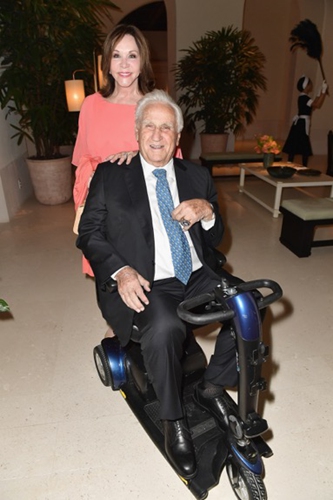Don Shula: architect of NFL’s invincible Dolphins
Source:AFP Published: 2020/5/7 23:58:41

Mary Anne and Don Shula attend the Four Seasons Hotel at The Surf Club Grand Opening on March 11, 2017 in Surfside, Florida. Photo: AFP
Don Shula carved his place onto the Mount Rushmore of NFL coaches over the course of a glittering coaching career that encompassed two Super Bowl wins, a record 347 victories and the only unbeaten season in history.
Shula, who died Monday aged 90, took over a fledgling Miami Dolphins outfit in 1970 and turned them into a dynasty, reaching three consecutive Super Bowls in the 1971, 1972 and 1973 seasons.
But it was the achievements of his 1972 side that ensured Shula's place in the pantheon, his team finishing the regular season with a perfect 14-0 record before three playoff wins left them on 17-0.
That season of invincibility has become the benchmark against which all dominant NFL sides measure themselves. Only Bill Belichick's 2007 New England Patriots, who completed a 16-0 regular season but lost the Super Bowl to the New York Giants, have come close.
It was Shula's wins and losses column that gave him most satisfaction in his later years.
"The 347 wins is the thing I'm most proud of," Shula said in a 2013 Miami Herald interview. "Nobody's even close to it."
George Halas, the legendary Chicago Bears coach, is second on 324.
Belichick has come up strongly on the rails, with 304 total victories but the New England coach remains substantially adrift of Shula's record.
The son of Hungarian immigrants, Shula was born in Grand River, Ohio, on January 4, 1930, playing American football at school before winning a scholarship to John Carroll University, a private Jesuit college in University Heights, Ohio.
Big break
After a brief flirtation with the priesthood - Shula decided against it because of his commitment to football - he graduated in 1951 and joined the Cleveland Browns in the first round of the NFL Draft.
A mobile defensive back, Shula played seven seasons in the NFL, joining the Baltimore Colts after the Browns in 1952 before finishing his career with the Washington Redskins in 1957.
After spells coaching in college football, Shula got his break in the NFL in 1960, joining the Detroit Lions and helping them forge the stingiest defense in the league.
In 1963, Baltimore owner Carroll Rosenbloom installed Shula as Colts head coach, making him, at 33, the youngest head coach in NFL history.
After an 8-6 first season in charge, Shula transformed the Colts into consistent contenders, with former teammate Johnny Unitas at quarterback for most of his reign.
But what should have been the crowning glory of Shula's reign in Baltimore ended in disappointment in 1969, when the Colts were stunned by Joe Namath and the New York Jets in a famous Super Bowl upset.
That defeat would strain the head coach's relationship with Colts owner Rosenbloom, and at the end of the 1969 season, Shula left for Miami.
Unbeaten run
Although Shula would soon lead Miami to the Super Bowl, more disappointment lay in store. His Dolphins were beaten 24-3 by the Dallas Cowboys.
"I remember telling the team afterwards, 'I don't ever want to feel this way again. We will not feel this way again!'" Shula would later recall.
Shula's redemption came the following season with the unbeaten year, which ended with the Miami coach finally breaking his Super Bowl curse after a 14-7 win over Washington.
"When you're 0-2 in the Super Bowl they say unkind things about you," he said. "They say, 'He can't win the big one.' And that's the worst thing that can be said about you. The only way to get 'em to stop is to win. And when we won, we won with an exclamation point."
Miami repeated as Super Bowl champions the following year, but it would be another nine years before they returned to the showpiece, losing to the Redskins 27-17 in 1983.
Quarterback Dan Marino carried Miami to another Super Bowl in 1985, but there was to be no third title for Shula as the San Francisco 49ers romped to a 38-16 blowout.
That was to be Miami's last Super Bowl appearance under Shula, and after a wild-card loss in 1995, he stepped aside to be replaced by Jimmy Johnson.
"We all felt there'd be a lot more Super Bowls for us," Shula said later. "The fact we didn't get back was one of the great regrets of my life."
Newspaper headline: Super Bowl King
Posted in: MISCELLANY,SPORTS FOCUS